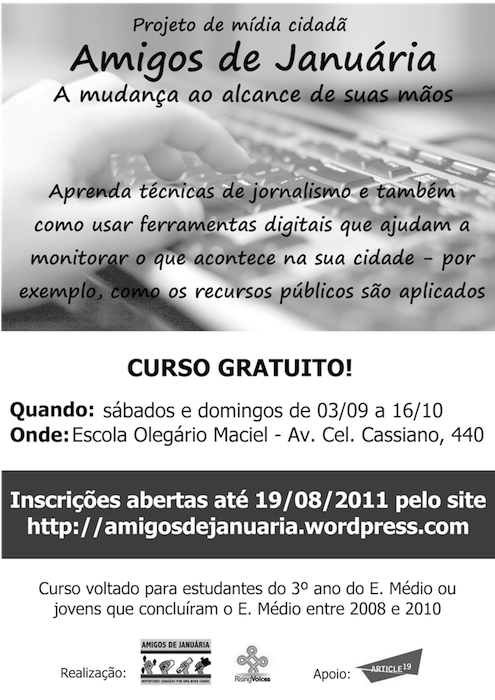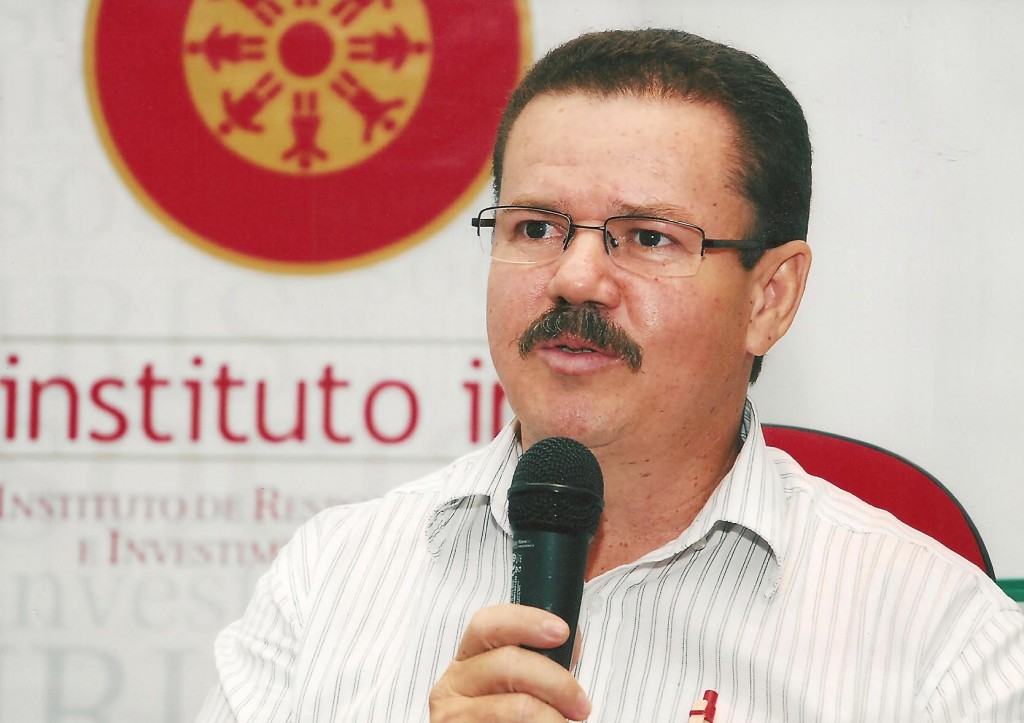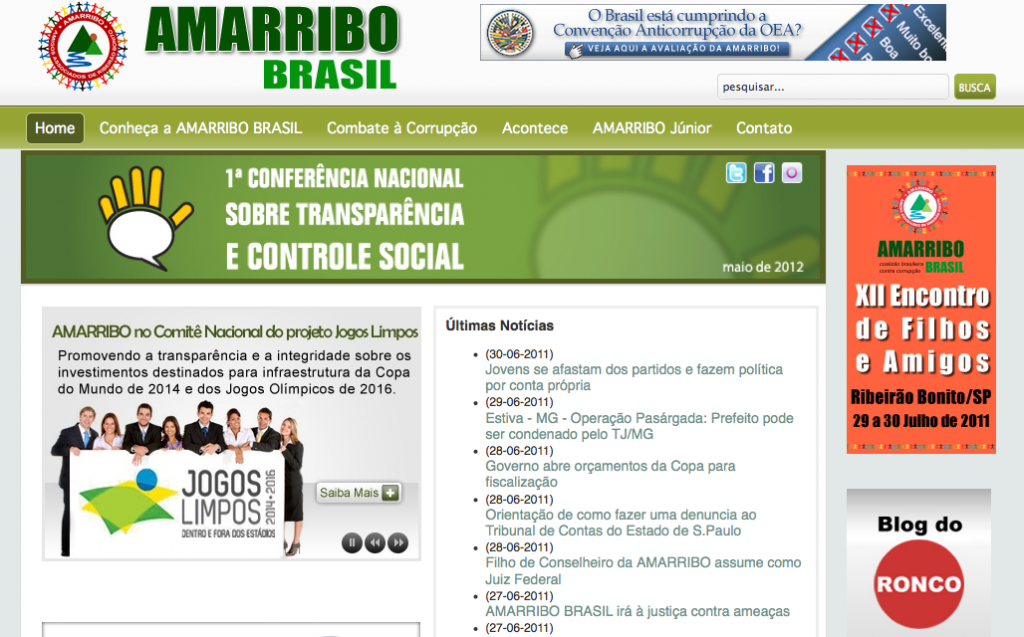This week, Januária's schools and colleges will receive this poster. It invites students to subscribe at the Friends of Januária project, which will take place in September and October, at Olegário Maciel Public School. It says: “Learn journalism skills and how to use digital tools that help to monitor what happens in your town – for example, how public resources are being spent”. To subscribe, the student must be studying at the last semester of High School or he must have graduated between 2008 and 2010. We already sent 120 of these posters to 10 schools and asked them to put them up at their classrooms. Subscriptions can be done until 19/08 at our new blog (in Portuguese): http://amigosdejanuaria.wordpress.com.
Tag Archives: friends of januaria
“Corruption kills people and death is forever”
“Associations of Friends”, a successful model to fight corruption
Today we will introduce you to our greatest partner, the Friends of Januária Association (Asajan) and we talk about the rise of the “Associations of Friends” model, focused on the fight against corruption, in many Brazilian small towns.
This story begins in 1999, when a group of citizens from Ribeirão Bonito, a small town in the São Paulo countryside, with a population of only 12 thousand people, created the NGO Associated Friends of Ribeirão Bonito (Amarribo). “After seeing the deterioration of their town, caused by the lack of public resources, a group of citizens started to search for alternatives to make Ribeirão Bonito recover from its problems”, explains the organization at its site (http://www.amarribo.org.br/).
In that same year, Amarribo started to suspect that the town's mayor was involved in the embezzlement of public funds. The main symptom was that the mayor's family was getting richer after he was elected. Then, Amarribo started an investigation, collected proof and made public accusations against him. Along with this process, Amarribo raised awareness about the issue of local governance among the town's residents – 10% of them (1,200 people) went to streets when the mayor was going to be released from office due to wrongdoings. Finally, the mayor was put in prison in 2002.
This story of success about the residents association which removed a corrupt politician from the town's administration was something pretty new in Brazil! Soon, Amarribo became an example to be followed by other towns and, little by little, the “Associations of Friends” model, focused on monitoring public administration, spread around the country. Nowadays, Amarribo's network has organizations in 173 towns in Brazil! One of them is Januária.
Januária is a small town in Northern Minas Gerais. Its residents keep on remembering the time when the town didn't have so many problems. Actually, Januária had a stronger economy and was one of the biggest and one of the most tradicional producers of “cachaça”, a brazilian drink. Then, things started to deteriorate in Januária.
Fabio Oliva, who is a local journalist (http://blogdofabiooliva.blogspot.com/), will never forget the day when his father had an cerebral hemorrhage. As the local hospital wasn't able to take care of him, he had to be sent to another hospital, 170 km far from Januária. In the middle of the road, the ambulance ran out of fuel. If it wasn't enough, it also ran out of oxygen. “Probably, my father would die anyway. But I wish he had died with more dignity inside a hospital, not on a road, without oxygen, under a 40˚C heat”, says Oliva. Angry about the poor conditions of Januária, Oliva met Amarribo's work and started to imagine how Januária could become a better place if its residents started to monitor the local administration. Soon after, Oliva gathered some friends in Januária and created Asajan. The year was 2004.
One of these friends was a municipal health advisor, Suely Pereira, a former hairdresser. Suely used to make copies of every public document that passed by her and brought four boxes full of documents from the public administration to the group. With these documents in their hands, Asajan's members had to learn how to investigate. And they learned well. “Since then, we have been fighting corruption and releasing corrupt mayors from office. Asajan was involved in all cases in which mayors were released from office due to wrongdoings”, says Suely.
The work done by Asajan also inspired many other citizen groups to create new “Associations of Friends” in the northern Minas Gerais. A success partnership between citizens who care for their town's future!
We are Friends of Januária
We are here to introduce to you the project “Friends of Januária”, in central Brazil, which will provide training to citizen reporters to monitor their public administration and budget and fight corruption.
First of all, it is worth telling you a little bit about the access to information in Brazil and about what has been happening in Januária for the last few years. Today, Brazil sees an open access to information movement in which civil society, collectives, NGO's and individuals are engaged in. There is a long way to go, since Brazil still doesn’t have an Access to Information Law. Some data is already available online, but one of the biggest challenges faced is that the data is spread across many sites, which are difficult to access. Although many journalists have special skills to access that data, the Brazilian media is highly concentrated in São Paulo, Rio de Janeiro, and Brasília, the most important towns in Brazil, and they can't monitor what happens in small towns far from big urban centers.
Let’s take a look in what happens in Januária, a small town in central Brazil with a population of 65,000. Januária has had a recent history of difficulties with its local government – in the span of eight years, the town has gone through seven different mayors, most of them removed from office because of mismanagement of public funds. Well, the town should be the focus of many reports, shouldn't it? But that doesn't happen. The local government receives little or no press coverage at all! If it wasn't for Fabio Oliva's work, who is a blogger and activist, few would be investigated by media. Oliva is one of the founders of the Association Friends of Januária (Asajan), which has been raising awareness about the issue of local governance among the town's residents, through investivative journalism work and public awareness campaigns.
The main objective of “Friends of Januária” is that citizens can become reporters of their own towns, getting access to public data. Access to information is a human right and should be available to all! Once they share that public data, they will raise community awareness about how important it is to fight corruption. So, the project's aim is to provide a course about access to public information which encourages participants to share the collected data through online reports.
We plan to start the course during second semester of 2011. Until now, our biggest challenge is to overcome the barriers posed by high transport costs – we need to move the course educators from São Paulo to Januária. The problem is that it is very expensive to go to one place to another in Brazil!! During the last weeks we have been searching for additional support to the Rising Voices grant because then it would be easier to pay for these costs and provide a longer course. We are confident that we will succeed!
Soon, we will start one of the most important parts of the work: to prepare the course material and its classes. We believe the material and the classes can be used in many other small towns, so we will do our best!! Our idea is to gather knowledge and experiences from different organizations, collectives and individuals that have worked with access to information, public administration monitoring, and corruption investigation. During this step, we will share everything with you here at the blog!



